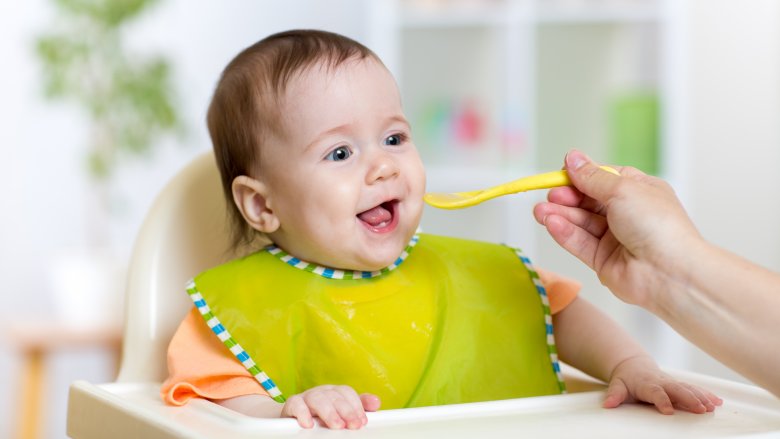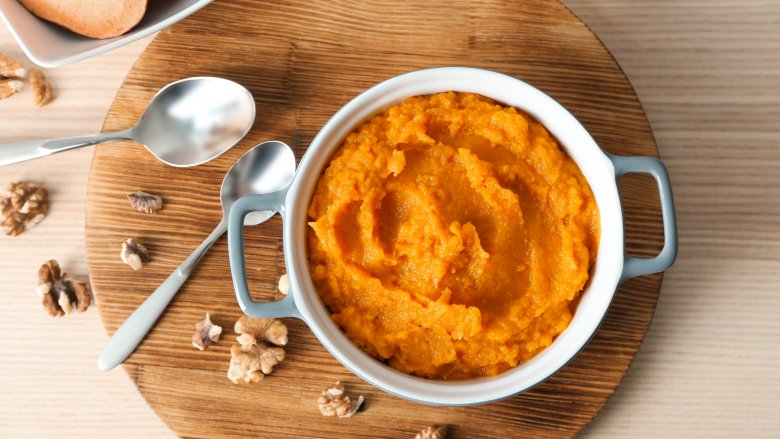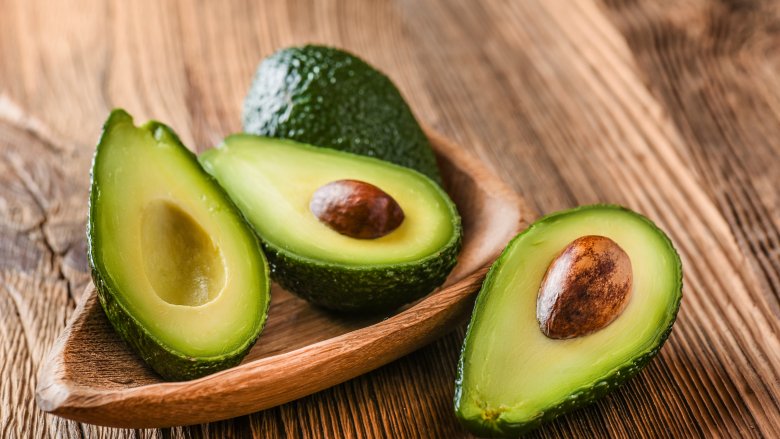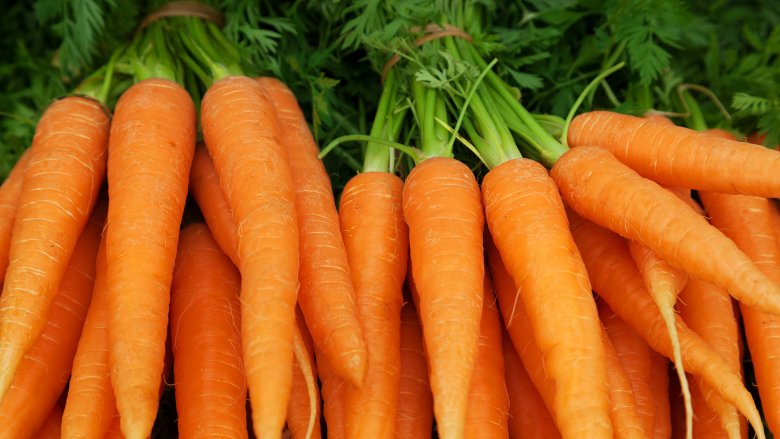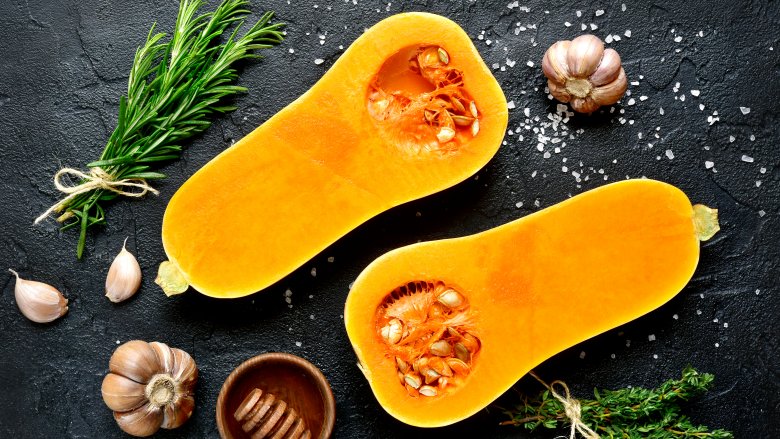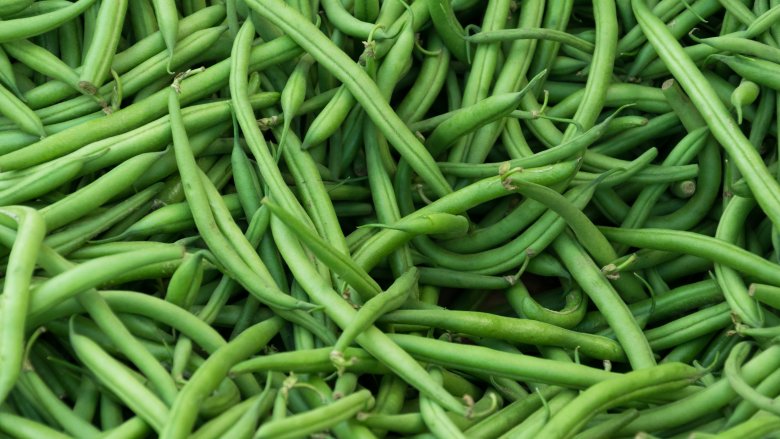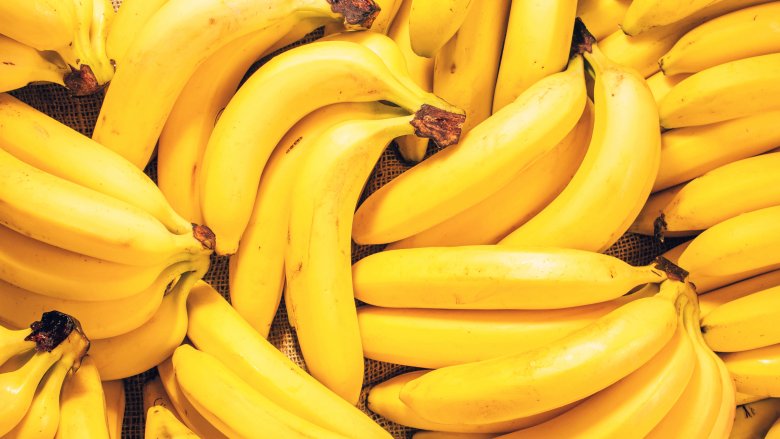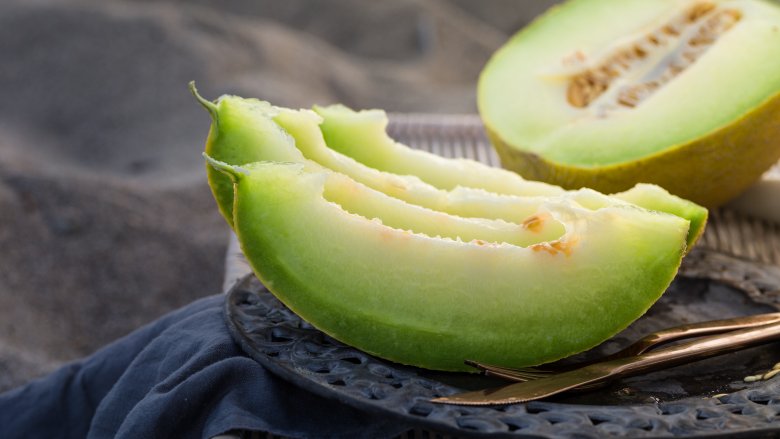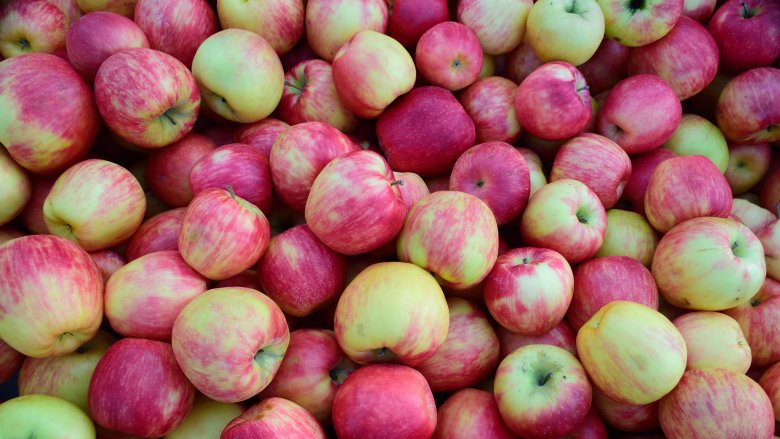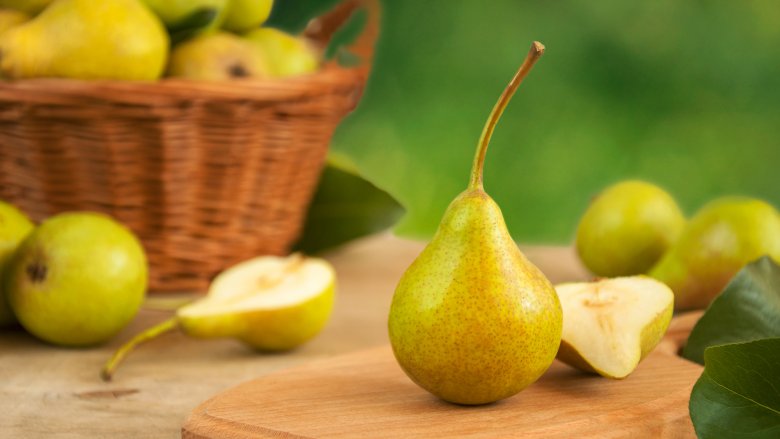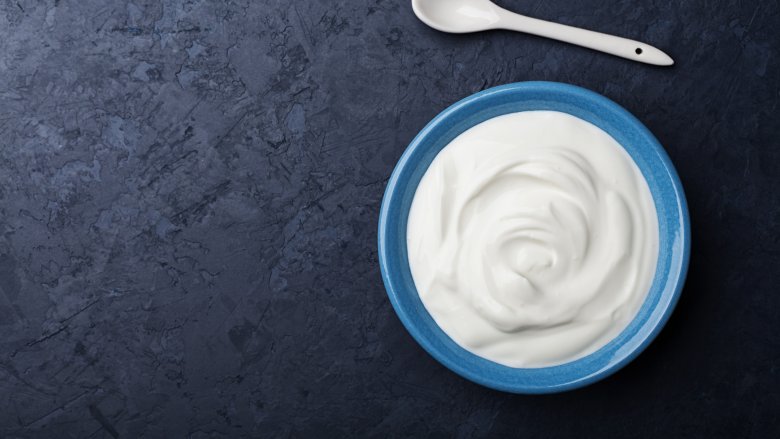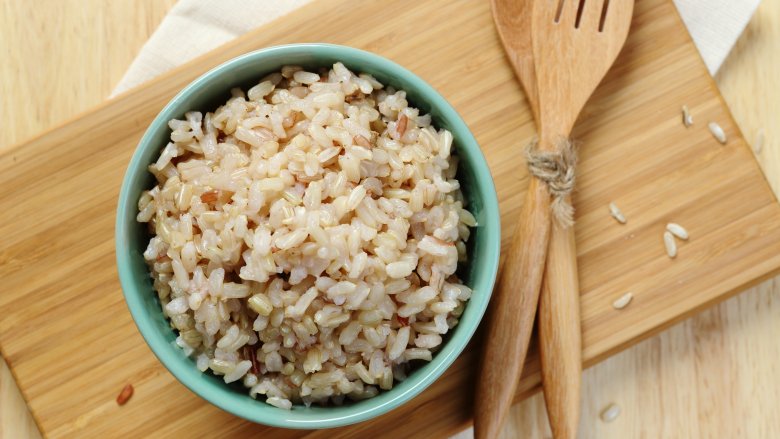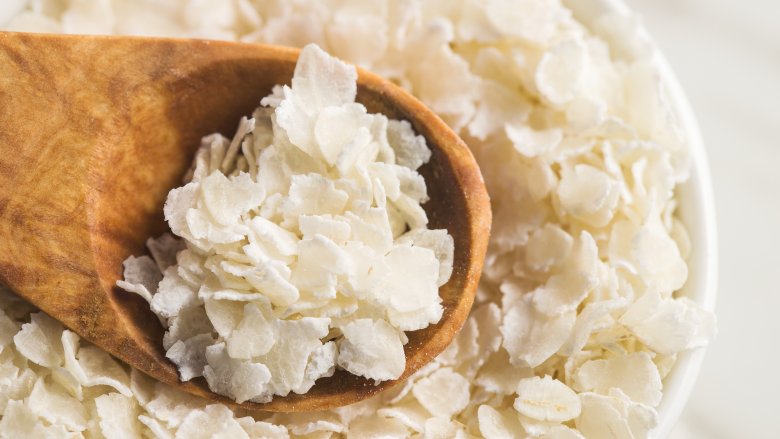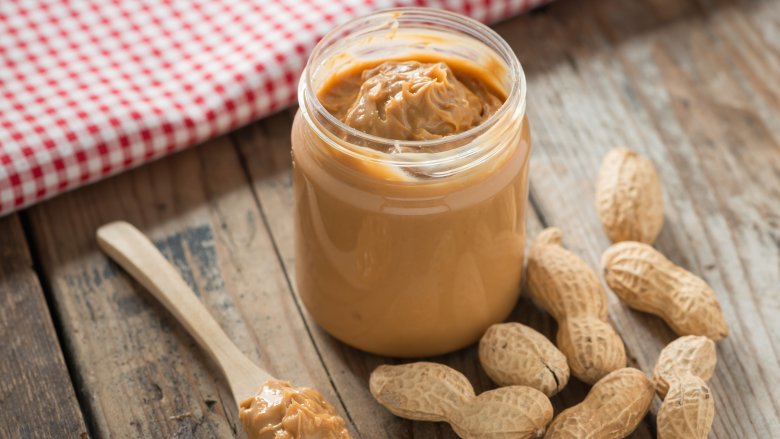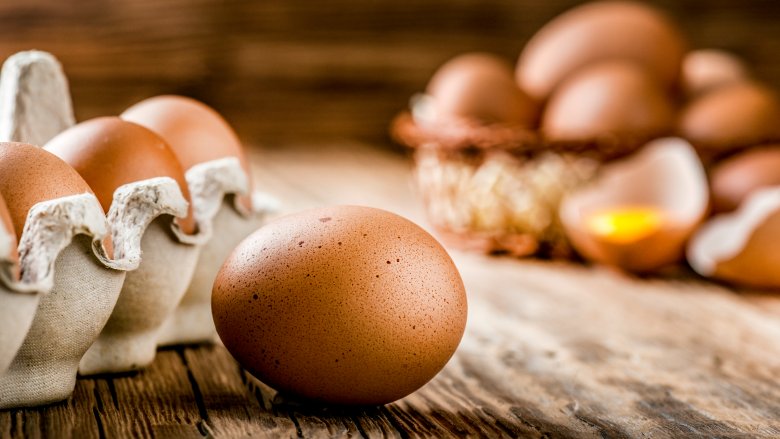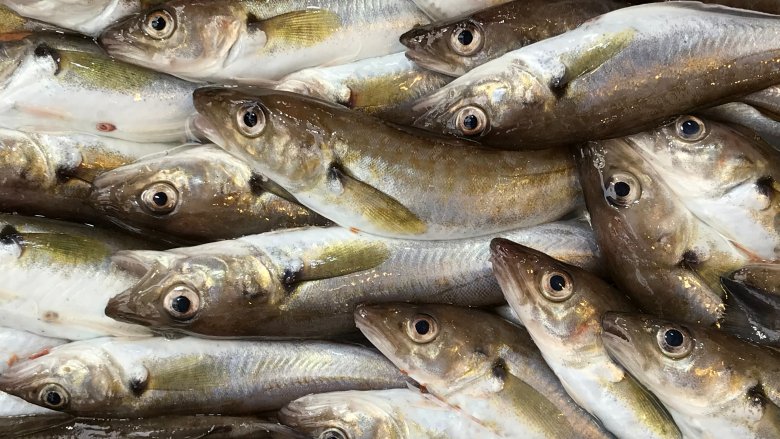The Best First Solid Foods To Feed Your Baby
Giving your baby solid foods for the first time can feel like a really, really big deal — and nobody would blame you for feeling a little apprehensive about the whole thing. After all, there are so many things that can go wrong: you've got your choking hazards, your allergic reactions, your nutritional considerations to take into account. And then, of course, there's the possibility that the kid just isn't going to take to food as easily as milk.
Well, the bad news is that none of these problems are entirely avoidable. They're just a part of being a parent, unfortunately. But that doesn't mean there aren't certain foods which will at least minimize the risks you're worried about. These are the foods which are healthy, easily eaten, delicious, and convenient enough to keep you worry-free as your baby takes his or her first bites. Get them on the menu, pronto — as long as your pediatrician says it's OK, of course.
Sweet potatoes
Sweet potato is the bread and butter of baby foods. (Bread and butter, meanwhile, is kind of like the fast food of baby foods, while fast food is practically the nuclear waste pile of baby foods). The biggest advantage we're looking at here is that it's very, very easily mashable when cooked, making it incredibly simple for your baby to eat. But that's not all — because sweet potato also comes with its fair share of nutritional benefits, too.
Sweet potatoes are pretty much a thriving hub of nutrients, vitamins and antioxidants. They're filled with vitamin C and iron, which will help boost the immune system; as well as magnesium and potassium, which are good for the heart. Carotenoids such as beta-carotene will also help limit the risk of cancer. Like normal potatoes, sweet potatoes are indeed classified a carbohydrate, but don't let that get you down — they're actually a complex carb, meaning they release sugars more slowly into the bloodstream than simple carbohydrates.
Avocados
Yes, it's true — much like the entire U.S. population of under 35s (and most of the state of California), your baby will also thrive on avocados. These fruits are particularly appealing to babies mostly because they're colorful and creamy in texture, meaning they're as fun to play with as they are tasty to eat. Naturally, they're also incredibly useful in making sure that kid stays good and healthy.
Avocados contain high amounts of folate, fiber, potassium, vitamin E and iron, as well as a number of nutritious chemicals such as the carotenoid lutein and our old friend beta-carotene. They also contain unsaturated fats, which you might be tempted to freak out over because of the word "fat." Don't fret, though, because those fats will help your baby develop their brain and grow properly. A medium-sized avocado contains around 322 calories and up to 30 grams of fat. Trust us, though: that's not a bad thing.
Carrots
These days, you shouldn't need to resort to telling your child that old sort-of-lie about how carrots make you see in the dark, because there are plenty of more palpable benefits to chowing down on the orange stuff. For one, they're very easy for babies to swallow and digest (just make sure you boil them first, so they're all nice and soft and easily mashed), but they're also one of the sweetest of the vegetables. And we don't need to tell you that kids like sweet stuff, do we?
Nutrition-wise, you're looking at beta-carotene, phytochemicals which protect against heart disease and cancers (and yes, also benefit your babies eyes), as well as fiber, iron, calcium and vitamin C. Fresh, home-cooked carrots are always great, but make sure your baby is at least six months old before they try them, since the presence of nitrates in carrots can — in some cases — cause anemia. Considering that six months is about the recommended age for babies to start eating solids, however, this shouldn't be too much of a worry for you.
Butternut squash
The benefits of butternut squash are numerous. Able to be introduced to your baby as soon as he or she starts eating properly, this winter squash is a particularly good source of fiber and potassium. The actual effects of these nutrients include an increased ability to fight fungal infections and other diseases, better digestion and a reduced chance of constipation, strong eyesight, and the suppression of free radicals inside the body.
Butternut squash is also pretty versatile, and can be steamed, boiled or roasted. It also goes well with a wide range of other baby foods (including apples, cheeses, sweet potatoes, bananas, carrots and pears) and can be easily included in all sorts of baby-friendly recipes. Just make sure to look out for the seeds — although they're actually incredibly good for you, they do present a choking hazard for young babies. Make sure they're all removed before you get cooking.
Green beans
Ah, green beans. They just fit, don't they? Green: good. Beans: good. Green beans... double good! Actually cooking these vegetables for babies might seem like a finickety task, but it's done easily enough. Simply steam or boil them in a small amount of water for no longer than 15 minutes, and serve either as-is or mashed up, depending on how far along your baby is on the solid food path. If the skins are causing you trouble, put them in a strainer and try to work them out before doing the mashing or pureeing. Otherwise, however, they should make a fine finger food.
Green beans are full of calcium, vitamin K, vitamin C, and vitamin A, and also contain a small amount of manganese. These nutrients can help prevent all kinds of conditions, including Alzheimer's, atherosclerosis, diabetic heart disease, colon cancer, asthma, arthritis, acne, ear infections, and potentially cold and flu. And sure, some of those conditions are obviously more important to worry about early in life than others, but you can never be too heavily-safeguarded against disease.
Bananas
This is a great one. Banana is an absolutely ideal to give your baby as a first food for many reasons. It's sweet and creamy, meaning kids will take an instant liking to it, and is also very easy to mash up and serve. (Once your baby is a little older, you can also cut it into pieces of an appropriate size and give it to them as a finger food). But the nutritional effects of bananas are where they really make their mark.
They're high in fiber, potassium, calcium, magnesium, iron, folate, niacin, vitamin B6, and vitamin A. That means less chance of constipation, prevention of urinary infections, strong bones, anaemia prevention, better memory and brain development, and stronger eyesight. They're also great at boosting the immune system and preventing coughs and colds, and they're easy to include in a range of recipes and dishes. Just make sure they're ripe and you limit their intake to one a day. All in all, that's not bad for one little fruit, is it?
Melon
We might be pushing the limits of the words "first solid foods" with this one, and some parents will be a little more comfortable waiting until eight months to start introducing melons to their child's diet. With some vigilance, however, they can be given as early as six months — just be aware that they can cause rashes (caused by acidity, not allergies) and should be introduced gradually. Don't forget to scoop out the seeds to avoid choking, either!
Of course, you might find that the health benefits of melons make them more than worth bringing in early. They're very high in vitamin A (one cup of cantaloupe alone is 100 percent of the daily recommended amount, in fact), vitamin C and calcium, as well as good ol' beta-carotene. On top of that, they're also watery and fun to eat, making them sure to be a hit with the little ones.
Apples
You're probably well aware of the notion that an apple a day keeps the doctor away, but did you also know it'll keep constipation, diarrhea, cholesterol, strokes, obesity, lung disease, cancers, bone problems, and organ conditions away, too? Well, yeah, actually — that's probably what the saying is getting at. Look, apple equals good. You know that (and we can prove it).
As a first food, apples should always be peeled (even if you're mashing or pureeing them) so as to avoid stomach and swallowing problems. Generally, they're best served soft or as part of another recipe, because raw apple is going to be a minor nightmare for babies with few or no teeth. The actual nutrients that babies will get out of apples include vitamin A, folate, potassium, calcium, phosphorus, magnesium, and selenium. They're also very high in insoluble fiber and soluble fiber, both of which are highly beneficial to bowel health.
Pears
Pears are great first food for babies for two main reasons: firstly, because they're incredible nutritious (more on that in a moment), and secondly because they're very, very easy to eat. Even the skin of a pear is easy to digest, and the fruit itself is very easy on the stomach. Even better, pears aren't sprayed with loads of pesticides and chemicals during the harvest. They're also very low in acids, meaning they can help relieve infant reflux, guard against asthma, and minimize the effects of gastroesophageal reflux disease. It generally is better to serve them peeled (to make them less of a choking hazard), and you should make sure to leave out the core (which is harder to pick out than, say, an apple).
For your efforts, you'll get a fruit which contains essential fatty acids, protects against cancer, prevents strokes and high blood pressure, is loaded with fiber and vitamin C, helps wounds heal quicker (woah!) and boosts the immune system. It's a superhero fruit!
Yogurt
Arguably the biggest advantage of giving yogurt to your baby is that it's very easy to prepare. No mashing, no pureeing, no peeling — just put it on a spoon and go for it. There's one crucial thing to remember here, though, and that's to make sure all the yogurt you buy for your baby is plain, unsweetened, and made from whole milk.
Flavored yogurts are almost always very high in added sugar, which can lead to tooth decay and obesity. Be on the look-out for any ingredients that may also mean sugar, too. These include: cane crystals, corn sweetener, corn syrup, dextrose, fructose, evaporated cane juice, fruit juice concentrates, honey, glucose, high-fructose corn syrup, lactose, maltose, malt syrup, molasses, and sucrose. Fat-free or low-fat yogurt is also a no-go, because babies require the calories and fats that come with whole milk.
Just because you're limited to one kind of yogurt doesn't mean you can't make it interesting, however. Try mixing or mashing in pureed fruit or vegetables (but never honey — it can cause botulism in children under the age of one). The big benefits of yogurt are live cultures, a type of bacteria which may help prevent colic, eczema and diarrhea. Just make sure you pick the right product and be aware of the symptoms of food allergies, and yogurt should make a great early food for your child.
Brown rice
Brown rice is a healthy food choice for adults, and in much the same way, brown rice (emphasis on the brown) can also be a highly nutritious food for babies to enjoy once they started on solid foods.
It's a low-risk allergen, contains plenty of essential fatty acids and is loaded with fiber. It also contains decent amounts of calcium, protein, fat, minerals and vitamins, which will all be very helpful indeed in fostering your baby's development. Some rules do apply, here: keep uncooked brown rice in the fridge to avoid it turning rancid, try not to use leftovers and consider pureeing rice after it's cooked to make it easier for your child to eat and digest it. Forget what you've heard about arsenic in rice, too — the chances of finding it in proper brown rice rice are practically zero and the benefits far outweigh the risks.
Rice cereals
Rice cereals are often a go-to beginner food for parents of young infants, and there are plenty of reasons to get started on them early. They help treat GERD and keep reflux away, making them great for babies who are prone to colic. They're a good source of calories, too, which can be a crucial factor in deciding a baby's diet. Generally, they're easy to digest and rarely cause allergic reactions.
Be warned, though: not everyone agrees about the benefits of rice cereals. Some nutritionists and dieticians warn that the iron in rice cereals doesn't absorb well, suggesting that babies find their iron in other sources instead. These alternate sources include pureed red meat (such as beef mince), dark poultry, egg yolks, beans, lentils, and pasta. As in any situation in which there's no real consensus to be found, the best thing for you to do is probably trust your own judgement and only give your baby what you're comfortable with. Or maybe go with what your pediatrician recommends.
Peanut butter
This probably won't come as much of a surprise, but it's heavily advised that you never give a young child peanuts. This, however, is more because they pose a choking risk than because of the whole allergen thing. In fact, exposing your baby to peanuts from an early age is a very good idea, as long as you do it properly. Enter peanut butter.
Recent research has shown that introducing peanuts to your baby's diet can reduce the risk of an allergy developing by up to 80 percent. Even with peanut butter, however, it's important to be wary — eating large amounts, such as by the spoonful, can be just as much of a choking hazard as the whole nuts themselves. Instead, try adding it to yogurt, mixing it into pancake batter, or even making it into a soup. And watch out for a reaction as your baby eats!
If all turns out okay, you'll have yourself a new food for your child to enjoy which is rich in protein and extremely tasty. Just make sure the stuff you buy is low on sugar and salt and you'll be golden.
Eggs
Eggs have often been a contentious choice of food for babies, but contemporary research has suggested that they can actually be a great first thing for kids to try. The main worry here is that eggs are one of the most common allergens, so it's important to watch out for any reactions that might occur shortly after consuming them. As long as your baby has no known history of food allergies, however, you can probably rest easy letting them try eggs for the first time. If you're worried about this, stick to egg yolks — it's the whites that usually cause allergic reactions.
With that in mind, let's talk nutrition. Egg whites contain most of the protein in eggs, as well as folate, selenium, calcium, magnesium, potassium and phosphorus. Egg yolks do contain cholesterol and saturated fats, but they also contain essential fatty acids and fat-soluble vitamins. Eat both and, of course, you'll get it all. Once again, it comes down to what you're comfortable with.
Fish
Fish is another funny one. Shellfish is off the cards entirely until they're at least a few years old, but many suggest that some fish is safe to give to babies as young as six months old. You should always check that the fish is good (springy flesh and a fresh smell are the things to look for) and you're best off sticking to white fish to begin with. The benefits are numerous, however: fish contain all nine amino acids, meaning they're a source of complete protein. You'll also get Omega 3s, which are highly powerful nutrients that can prevent skin problems such as eczema. You're also looking at a range of minerals and vitamins, too.
Fish can be an allergen, so be vigilant for any reactions that may occur, and stay away from fish that are high in mercury; these include shark, swordfish, king mackerel, white tuna and tilefish. Cook thoroughly and always de-bone to prevent choking. Otherwise, sit back, relax, and try to enjoy knowing that your baby is all proteined up!
